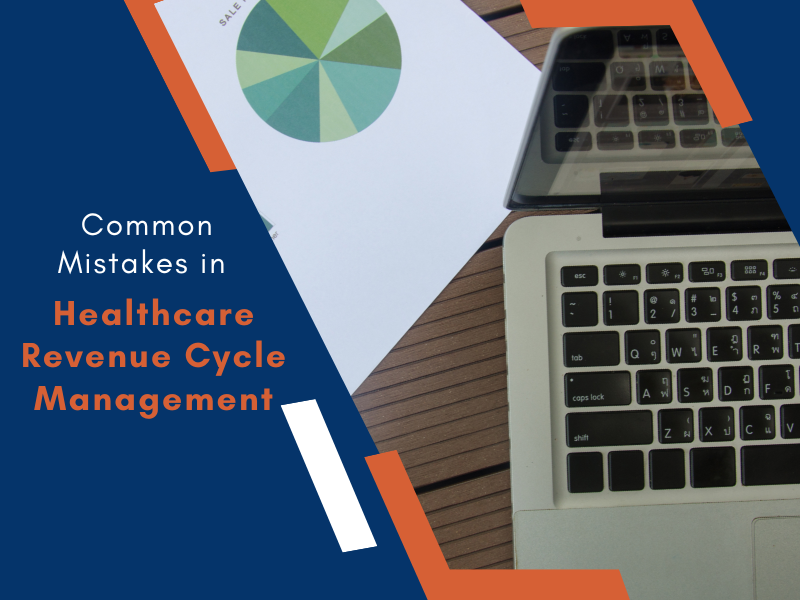Managing the healthcare revenue cycle efficiently is critical for any healthcare organization aiming to maintain a healthy financial flow and ensure patient satisfaction. However, even the most experienced providers often encounter pitfalls that can disrupt their operations. Identifying and avoiding these common mistakes in Healthcare Revenue Cycle Management can save organizations time, money, and frustration.
Understanding Healthcare Revenue Cycle Management
Before diving into common mistakes, it’s essential to understand what Healthcare Revenue Cycle Management (RCM) entails. RCM encompasses the financial processes that begin when a patient schedules an appointment and continue through billing, claims processing, and payment collection. It ensures that healthcare providers receive timely reimbursement for services rendered while maintaining a seamless experience for patients.
Now, let’s explore the common mistakes and how they can impact healthcare organizations.
1. Inaccurate Patient Information Collection
One of the most prevalent mistakes is incorrect or incomplete patient information. When patient details, such as insurance coverage or contact information, are inaccurate, it can lead to denied claims or delayed payments.
Impact:
- Claims rejections
- Increased administrative workload
- Poor patient satisfaction
Solution:
Train front-desk staff to verify and input accurate information during registration. Regularly update patient records and use automated tools to reduce human errors.
2. Failure to Verify Insurance Eligibility
Neglecting to verify a patient’s insurance eligibility before providing services is another common issue. Without proper verification, providers may offer services that are not covered by the patient’s insurance plan, leading to payment delays or denials.
Impact:
- Revenue loss
- Frustrated patients facing unexpected bills
Solution:
Implement real-time insurance verification systems to confirm coverage and eligibility before the appointment. This proactive approach minimizes disruptions in the billing process.
3. Errors in Medical Coding and Billing
Mistakes in medical coding and billing can result in denied or underpaid claims. These errors often arise from using outdated codes, incorrect modifiers, or missing documentation.
Impact:
- Increased claim rejections
- Loss of revenue
- Audits and penalties
Solution:
Invest in training certified medical coders and use advanced billing software to stay updated with the latest coding guidelines. Regular audits can help identify and rectify errors early.
4. Not Following Up on Denied Claims
Denied claims are a reality in healthcare, but failing to follow up on them is a costly mistake. Many providers lose revenue simply because they lack a system to track and resolve denials.
Impact:
- Uncollected revenue
- Lower cash flow
Solution:
Establish a dedicated team to handle denied claims. Analyze the reasons for denial and address them promptly. Using denial management software can also streamline this process.
5. Lack of Staff Training
A knowledgeable team is the backbone of effective Healthcare Revenue Cycle Management. Staff members who are not adequately trained on policies, billing codes, or compliance requirements are more likely to make costly mistakes.
Impact:
- Increased errors
- Non-compliance penalties
- Patient dissatisfaction
Solution:
Conduct regular training sessions for all employees involved in the revenue cycle. Ensure they are aware of the latest regulations and industry standards.
6. Neglecting Patient Payment Collections
Failing to collect payments at the point of service can significantly impact cash flow. Patients often leave without understanding their financial responsibilities, leading to unpaid bills.
Impact:
- Increased patient accounts receivable
- Revenue delays
Solution:
Clearly communicate payment expectations upfront. Offer multiple payment options, including online portals, to make it easier for patients to settle their balances.
7. Inefficient Claims Submission Process
Submitting claims manually or without proper checks can result in delays and rejections. Inefficient claims submission processes waste time and hinder revenue collection.
Impact:
- Reduced efficiency
- Increased claim errors
Solution:
Automate the claims submission process using reliable software. Ensure all claims are reviewed for accuracy and completeness before submission.
8. Ignoring Key Performance Metrics
Many healthcare providers fail to track and analyze key performance indicators (KPIs) related to their revenue cycle. Without this data, identifying problem areas becomes challenging.
Impact:
- Missed opportunities for improvement
- Reduced revenue
Solution:
Monitor KPIs such as days in accounts receivable, denial rates, and collection rates. Use data analytics tools to gain insights and make data-driven decisions.
9. Overlooking Compliance Requirements
Non-compliance with healthcare regulations, such as HIPAA and the Affordable Care Act, can lead to legal troubles and financial penalties. Providers who overlook compliance often face unnecessary risks.
Impact:
- Fines and audits
- Loss of reputation
Solution:
Stay updated on healthcare laws and regulations. Conduct regular compliance audits and ensure that all staff members are trained on maintaining compliance.
10. Lack of Technology Integration
Relying on outdated systems or manual processes in a technology-driven era can hinder efficiency. Many healthcare organizations fail to integrate advanced tools into their revenue cycle, leading to missed opportunities for automation and optimization.
Impact:
- Increased operational costs
- Slower processing times
Solution:
Invest in modern RCM software that integrates seamlessly with electronic health records (EHR) and other systems. Leverage technology to streamline workflows and improve accuracy.
11. Inadequate Communication with Patients
Poor communication about billing and payment processes can lead to confusion and frustration for patients. This is often a result of unclear bills or a lack of follow-up.
Impact:
- Lower patient satisfaction
- Delayed payments
Solution:
Provide clear, itemized bills and ensure patients understand their financial responsibilities. Offer proactive support through customer service or billing portals.
The Importance of Avoiding RCM Mistakes
Mistakes in Healthcare Revenue Cycle Management don’t just affect finances—they can also damage patient trust and the overall reputation of the healthcare provider. By addressing these common errors, organizations can improve their operational efficiency, boost cash flow, and enhance the patient experience.
Why Choose Apaana Healthcare for Your RCM Needs?
At Apaana Healthcare, we understand the complexities of Healthcare Revenue Cycle Management and the challenges providers face. Our team is committed to helping you overcome these hurdles with tailored solutions that streamline your revenue cycle and maximize your financial performance.
Here’s why Apaana Healthcare is your trusted partner:
- Operational Excellence: We specialize in global healthcare management solutions that drive efficiency and reduce costs.
- Comprehensive Services: Our expertise includes member enrollment, claims administration, medical billing & coding, and provider engagement.
- Advanced Technology: We use cutting-edge tools to ensure accuracy and optimize every step of your revenue cycle.
- Cost-Effective Solutions: By outsourcing your RCM processes to us, you can focus on patient care while we handle the complexities of billing and claims management.
Partner with Apaana Healthcare Today
Don’t let common revenue cycle mistakes hold your organization back. Trust Apaana Healthcare to transform your financial operations and deliver measurable results. Contact us today to learn how we can help your healthcare organization thrive.





